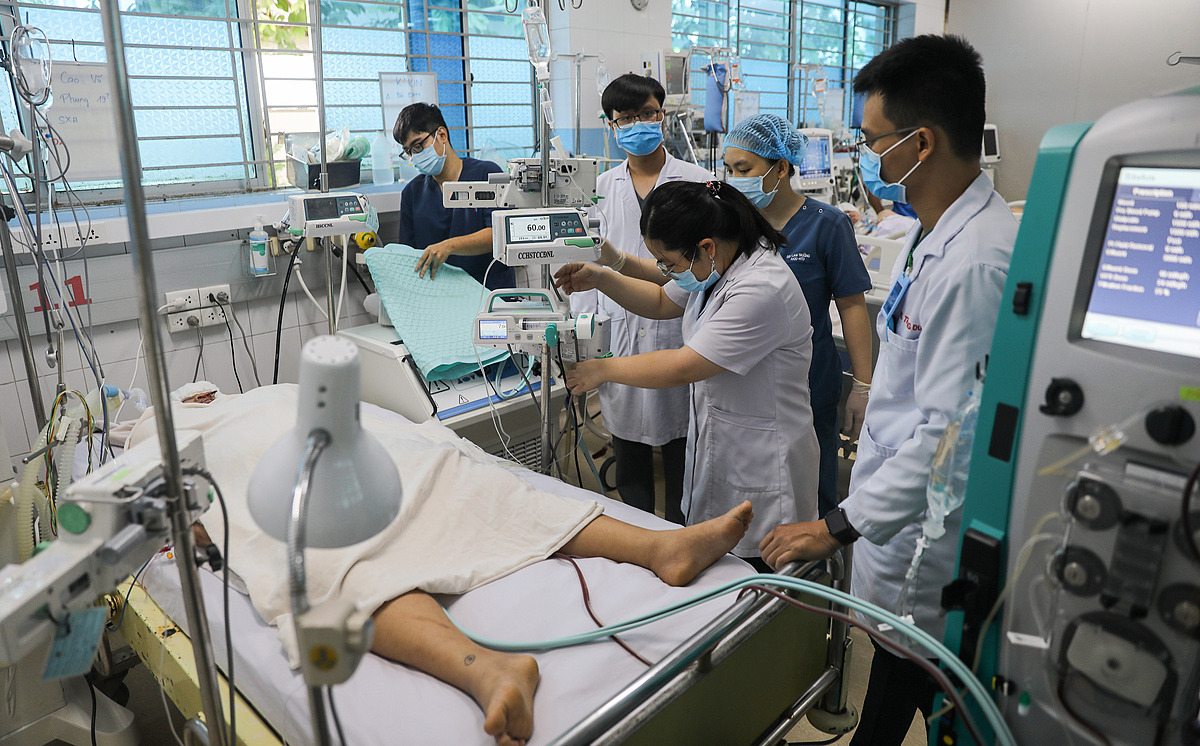On 8/8, Doctor Truong Ngoc Trung, head of the Adult Critical Care and Toxicology Department at the Hospital for Tropical Diseases in Ho Chi Minh City, described the case of a 33-year-old female factory worker. She initially presented with a high fever and severe body aches. After two days of using antipyretics, her condition didn't improve as it typically would with a common cold. Instead, her fatigue worsened, accompanied by nausea, loss of appetite, and a dull abdominal pain.
Upon admission to the hospital, doctors diagnosed her with severe dengue fever, complicated by shock and significant liver and kidney damage. Plasma leakage caused her blood to thicken, her blood pressure to drop, and fluid to accumulate around her lungs, leading to circulatory and respiratory failure. Simultaneously, the dengue virus continued its assault, causing liver and kidney failure, pushing her into multiple organ failure – a life-threatening complication.
Recognizing the critical nature of her condition, the medical team immediately implemented life-saving measures. She was intubated, placed on continuous dialysis, given fluids, blood, and blood products, administered vasopressors, and received organ support.
The fight for her life intensified as she battled persistent infections, requiring the strongest antibiotics available. After more than three weeks of intensive care, her condition stabilized, and her organs began to recover.
"When I woke up, I realized I had just returned from death's door," she said. She was subsequently weaned off the ventilator, her condition stabilized, and she was discharged.
According to Doctor Trung, this case highlights the severity of dengue fever. Many young adults often assume their strong immune systems will protect them. However, dengue fever can progress rapidly and severely, even in healthy individuals, causing shock, multiple organ failure, and death if not promptly diagnosed and treated.
"A robust immune system can be a double-edged sword, triggering a 'cytokine storm' that damages blood vessel walls, leading to plasma leakage, shock, and organ damage," he explained.
Among the patients currently being treated in his department, many severe cases are young and otherwise healthy individuals. Some mistake dengue fever for a common viral infection, attempting self-treatment at home and only seeking hospital care when the disease has reached a dangerous stage with complicated and difficult-to-treat complications.
Recently, a 21-year-old woman arrived at the emergency room in critical condition. Despite close monitoring and prompt shock management, her condition deteriorated rapidly. She developed several critical dengue fever complications, including massive plasma leakage, retroperitoneal bleeding, and severe coagulopathy. Within a short period, she experienced multiple organ failure.
Doctors raced against time, implementing multiple emergency resuscitation measures, including shock management, intubation, and continuous dialysis. A central venous line was established to administer large volumes of blood products – red blood cells, platelets, and fresh frozen plasma – to compensate for blood loss and restore clotting function.
 |
Doctors at the Hospital for Tropical Diseases in Ho Chi Minh City treat a patient with severe dengue fever. Photo: Quynh Tran |
Doctors at the Hospital for Tropical Diseases in Ho Chi Minh City treat a patient with severe dengue fever. Photo: Quynh Tran
Doctor Trung warned that the critical phase of dengue fever is from the 3rd to the 7th day of illness, often after the fever has subsided. The misconception that "no fever means recovery" leads to a false sense of security. This period is precisely when the most dangerous complications can occur.
If dengue fever is suspected, individuals should seek immediate medical attention for diagnosis and treatment. Be especially vigilant for warning signs requiring hospitalization, such as fatigue, lethargy, restlessness, abdominal pain, frequent vomiting, and any form of bleeding (nosebleeds, bleeding gums, vomiting blood, or black stools). Avoid self-administering intravenous fluids, as this can worsen the condition.
Ho Chi Minh City is currently experiencing a peak in dengue fever cases, with a rapid increase in infections and spread. The rising number of severe cases and fatalities is putting a strain on the healthcare system. The most effective preventive measures are avoiding mosquito bites, eliminating mosquitoes and their larvae, maintaining a clean and well-ventilated living environment, and getting vaccinated.
Le Phuong












